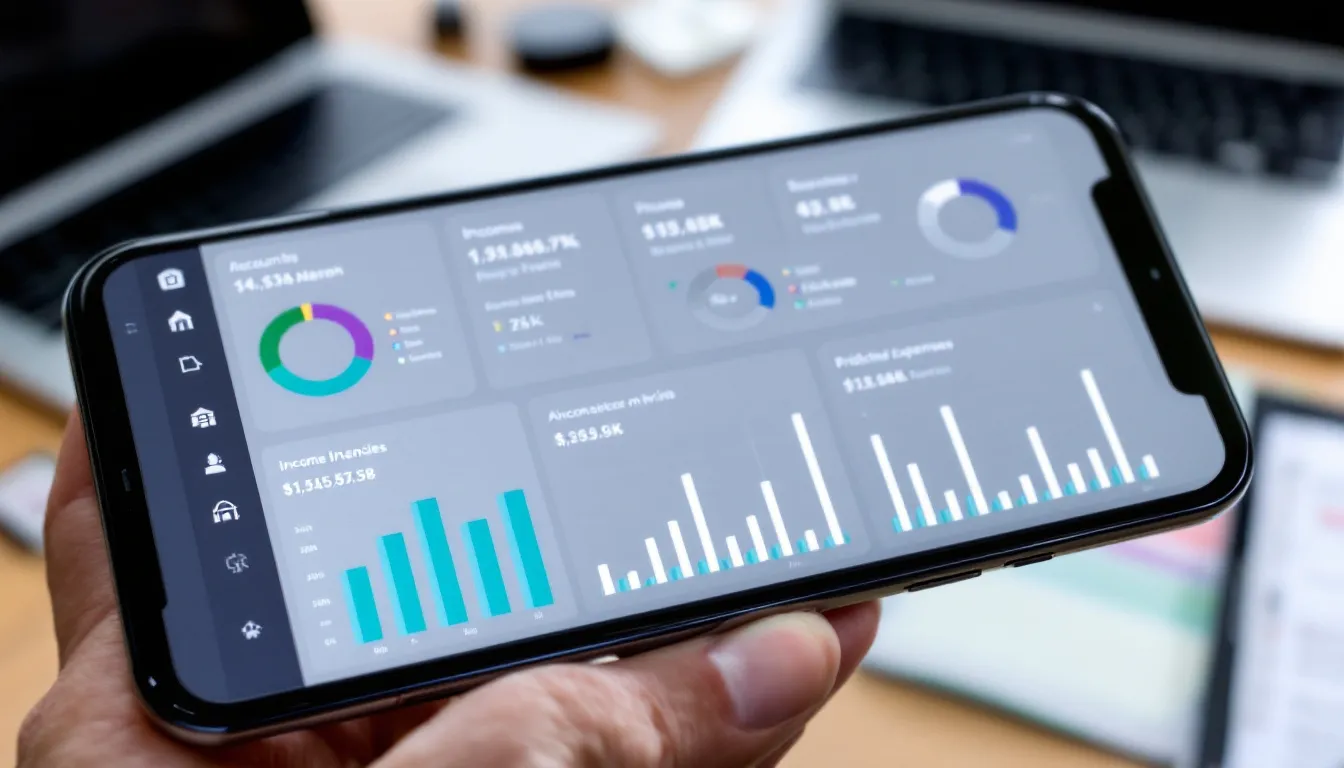Managing finances as a small business owner feels overwhelming when you’re juggling invoices, expenses, and cash flow while trying to grow your business. You’re not alone in this struggle – countless entrepreneurs find themselves drowning in paperwork, spending late nights reconciling bank accounts, and constantly worrying about their financial health. The traditional methods of tracking money through spreadsheets and using a physical planner are examples of outdated approaches that simply can’t keep pace with modern business demands, and a physical planner can be especially cumbersome compared to digital solutions.

The stakes couldn’t be higher. Poor financial management doesn’t just create stress – it threatens your business’s very survival. With the right accounting software for small business operations, you can transform this chaos into clarity, saving time while protecting your investment. This comprehensive guide will show you exactly how modern small business accounting software can revolutionize your financial management, helping you make better decisions and focus on what matters most: growing your business.
Why Small Business Accounting Software is Essential for Your Success
Running a small business without proper accounting software is like trying to navigate without a map. The overwhelming majority of small business owners face the same crushing reality: 82% of small businesses fail due to cash flow problems, with poor financial tracking being a primary cause of these failures. When you can’t track where your money goes or when it’s coming in, every financial decision becomes a gamble with your business’s future.
The pain points are all too familiar. You spend your first thing every morning trying to figure out which bills need immediate attention. You waste precious hours each week manually entering transactions, categorizing expenses, and attempting to reconcile bank accounts. These manual processes don’t just consume your time – they actively harm your business. Many business owners feel they don’t have enough time to focus on growth. Research shows that manual bookkeeping leads to 40% more errors and consumes 5-10 hours weekly that could be spent growing your business instead.
Consider the real cost of outdated financial management methods. Small businesses lose an average of $12,000 annually due to delayed invoicing and poor expense tracking. That’s money that could be reinvested into your business, used to hire additional help, or simply kept as profit to improve your family’s well being. With better management, there could be more money available for reinvestment or profit. Every minute spent on manual bookkeeping is a minute stolen from strategic planning, customer service, or product development. Accomplishing important financial tasks quickly allows owners to focus on strategic goals.
Modern accounting software represents the solution to these persistent problems. By automating routine tasks, providing real-time insights, and streamlining your financial processes, the right software can eliminate the stress and inefficiency that plague traditional accounting methods. When major financial tasks are accomplished efficiently, business owners feel a sense of achievement and motivation. Instead of spending your week buried in paperwork, you can accomplish tasks that actually drive revenue and growth.
The transformation isn’t just about convenience – it’s about survival and success. Businesses that implement proper accounting software report dramatic improvements in cash flow management, reduce stress levels among owners and staff, and create more time to focus on strategic priorities. It’s important to regularly evaluate your financial management strategies to ensure continued improvement. When you can track every transaction, monitor your cash flow statement in real-time, and generate accurate reports at the click of a button, you gain the control and confidence needed to make smart business decisions.
Top Features Every Small Business Accounting Software Should Have
When evaluating accounting software options, certain key features separate truly effective solutions from basic tools that leave you struggling with the same old problems. Many of these features are especially helpful for streamlining financial management and making day-to-day operations smoother. The most critical capability is automated invoicing and payment processing, which can reduce late payments by up to 70%. This feature transforms your accounts receivable process from a constant source of anxiety into a smooth, predictable system that keeps cash flowing into your business. Additionally, automated invoicing and payment processing help you develop essential financial management skills by encouraging consistency and accuracy in your billing practices.
Real-time expense tracking with receipt capture and bank account integration forms the backbone of effective financial management. Modern software allows you to photograph receipts with your phone, automatically categorizing expenses and linking them to the appropriate accounts. This eliminates the nightmare of shoebox bookkeeping while ensuring you never miss a deductible expense during tax preparation. By reducing manual work, real-time expense tracking makes you more productive and allows you to focus on higher-value activities.
Cash flow management tools represent perhaps the most valuable feature for small business success. Your software should provide clear visibility into accounts receivable and payable, showing you exactly when money will come in and when bills are due. This capability helps you plan ahead, avoid overdraft fees, and make informed decisions about when to spend money on growth initiatives or capital investments. The software also helps you stay on top of every task related to your finances, ensuring nothing slips through the cracks.
Tax preparation features with automatic categorization and deduction tracking can save you thousands of dollars and countless hours of stress. Quality accounting software maintains your records in a format that accountants appreciate, automatically tracks business expenses by category, and generates the reports needed for tax filing. During tax season, instead of scrambling to organize receipts and calculate deductions, you’ll have everything organized and ready.
Financial reporting capabilities including profit & loss statements, balance sheets, and cash flow statements provide the insights needed to understand your business performance. For example, a cash flow statement shows how income from sales, interest, and other sources is tracked and properly accounted for, along with outflows from expenses and investments. These reports help you identify trends, spot problems before they become crises, and demonstrate your financial health to lenders or investors. Tracking income and interest in these reports ensures all financial activities are accurately accounted for, giving you a complete picture of your business. The ability to generate these reports instantly, rather than waiting for monthly bookkeeping sessions, gives you a significant advantage in managing your business.
Multi-user access for business owners, accountants, and bookkeepers ensures everyone stays on the same page. Your software should allow different permission levels, enabling your accountant to access what they need while keeping sensitive information secure. This collaboration capability eliminates the back-and-forth of sharing files and ensures everyone works with the most current financial data.
Best Accounting Software Solutions for Small Businesses
Cloud-Based Accounting Platforms
The modern standard for small business accounting has shifted decisively toward cloud-based solutions that offer unprecedented flexibility and reliability. Leading platforms like QuickBooks Online, FreshBooks, and Xero have earned their reputations by delivering comprehensive features at reasonable prices, typically ranging from $15-50 per month for most small business needs.
QuickBooks Online dominates the market with good reason, offering the most comprehensive feature set and seamless integration with over 650 third-party applications. Its strength lies in scalability – you can start with basic invoicing and expense tracking, then add payroll, inventory management, and advanced reporting as your business grows. The software excels at helping businesses transition from sole proprietorships to multi-employee companies without requiring a complete system change.
FreshBooks takes a different approach, focusing intensely on user experience and customer service. It’s particularly well-suited for service-based businesses that need robust time tracking, project management, and client communication tools. The platform’s intuitive interface means less time spent learning complex software and more time focused on serving customers.
Xero rounds out the top tier with its unlimited user model and excellent integration ecosystem. For businesses that need multiple people accessing financial data – owners, bookkeepers, accountants – Xero’s approach eliminates per-user fees that can quickly add up with other platforms. Its multi-currency support also makes it ideal for businesses with international operations.
The benefits of cloud access extend far beyond convenience. You can work from anywhere with an internet connection, collaborate with your accountant in real-time, and rest assured that your data is automatically backed up and secured. Cloud-based solutions also receive automatic updates, ensuring you always have access to the latest features and security improvements without manual installation.
Free Accounting Software Options
For businesses just starting out or operating on extremely tight budgets, free accounting software can provide essential functionality without the monthly expense. Learning to use these tools is similar to picking up basic financial skills that are not always taught in school, where traditional education often overlooks practical money management. Wave Accounting stands out as the best free option, offering professional invoicing, basic bookkeeping, and expense tracking without cost. The software generates revenue through optional payment processing and payroll services, allowing core accounting features to remain free.
Zoho Books offers a generous free tier for micro businesses earning under $50,000 annually. This option works particularly well for very small operations that need basic invoicing and expense tracking but haven’t yet reached the complexity requiring advanced features. The free plan includes customer management, basic reporting, and mobile access.
However, free software comes with important limitations. You’ll typically have fewer integrations available, which can create manual work when connecting with banks, payment processors, or other business tools. Customer support is often limited to email or community forums, meaning you might wait longer for help when problems arise. The reporting capabilities in free versions are usually basic, potentially limiting your ability to analyze business performance deeply.
Understanding when to upgrade becomes crucial for growing businesses. If you find yourself spending significant time on workarounds, need advanced reporting for decision-making, or require integrations that aren’t available in free versions, the cost of paid software often pays for itself through time savings and improved capabilities.

How Accounting Software Solves Common Small Business Pain Points
The transformation that occurs when businesses move from manual processes to automated accounting software addresses fundamental challenges that plague small business owners daily. Cash flow management, historically one of the most stressful aspects of business ownership, becomes significantly more manageable with automated invoicing systems that reduce payment delays from an average of 45 days to 22 days.
Tax preparation stress practically disappears when your software tracks deductible expenses automatically throughout the year. Instead of the annual scramble to organize receipts, categorize expenses, and hope you haven’t missed important deductions, quality accounting software maintains everything in proper order. Business owners typically save 15+ hours during tax season while often discovering additional deductions worth thousands of dollars.
Financial visibility represents another area of dramatic improvement. Real-time dashboards provide instant insights into business performance and profitability, replacing the guesswork that comes with outdated or incomplete financial information. You can see at a glance whether you’re profitable, which customers owe money, and when major expenses are due. All cash flows, including those from investing and financing activities, are properly accounted for, ensuring comprehensive and accurate financial reporting. This visibility enables proactive decision-making rather than reactive crisis management.
Error reduction might be the most immediately noticeable benefit. Automated calculations eliminate 95% of manual entry mistakes that cost businesses time and money. When your software automatically imports bank transactions, applies them to the correct accounts, and maintains balanced books, you avoid the frustration and expense of hunting down discrepancies weeks or months later.
The psychological benefits shouldn’t be underestimated. Business owners report sleeping better, feeling more confident about financial decisions, and experiencing less anxiety about their business’s financial health. Improved financial management not only reduces stress but also contributes to a better quality of life for business owners, allowing them to focus on personal fulfillment and well-being. When you can accomplish tasks efficiently and trust your financial data, you create mental space to focus on growth, innovation, and the aspects of business ownership you actually enjoy.
Essential Integrations and Add-Ons for Small Business Accounting
Modern accounting software becomes exponentially more powerful when connected to the other tools you use to run your business. Payment processing integration with platforms like Square, PayPal, and Stripe creates a seamless flow from sale to accounting entry, eliminating manual data entry while ensuring every transaction is properly recorded. By paying for integrated services, you can save time and reduce manual work, allowing your team to focus on higher-value tasks. This integration also accelerates customer payments by offering convenient payment options that reduce friction in the purchasing process.
Banking connections for automatic transaction import represent perhaps the most valuable integration for daily operations. When your checking, savings, and credit card accounts feed transactions directly into your accounting software, you eliminate hours of manual entry while ensuring nothing falls through the cracks. The software can often categorize recurring transactions automatically, learning your patterns and reducing the time needed for monthly reconciliation.
Payroll software integration streamlines one of the most complex aspects of business management. Rather than manually calculating wages, taxes, and benefits, integrated payroll systems handle these calculations automatically and post the appropriate entries to your accounting system. This integration ensures accuracy while maintaining compliance with federal and state requirements.
E-commerce platform connections for Shopify, WooCommerce, and Amazon seller accounts automatically sync sales data, inventory changes, and fees into your accounting system. For businesses selling online, this integration eliminates the tedious process of manually recording each sale while providing accurate profit calculations that account for platform fees and shipping costs.
CRM integration enhances both sales tracking and customer management by syncing customer data between systems. When your accounting software knows your sales pipeline and customer history, you can generate more accurate cash flow projections and identify your most profitable customer relationships.
Industry-Specific Accounting Software Considerations
Different types of businesses require different approaches to financial management, and the best accounting software for your specific industry can significantly impact your success. Service-based businesses should prioritize time tracking, project management, and client billing features that help accurately capture billable hours and manage multiple projects simultaneously. These businesses often need detailed reporting on project profitability and the ability to bill clients based on time and materials. Additionally, accounting software can help schedule meetings with clients, ensuring important deadlines are met and that all commitments are managed efficiently.
Retail businesses face unique challenges around inventory management, point-of-sale integration, and multi-location capabilities. Your accounting software should track inventory levels, cost of goods sold, and provide detailed sales reporting by location or product category. Integration with your POS system ensures that every sale automatically updates both inventory levels and financial records.
Freelancers and consultants need software that excels at expense tracking, mileage logging, and 1099 contractor management. These businesses often have numerous small expenses that need careful tracking for tax purposes, plus the complexity of managing payments to subcontractors. The ability to generate 1099 forms automatically saves significant time during tax season.
Construction and contractor businesses require specialized features like job costing, equipment tracking, and progress billing. These businesses often work on long-term projects where costs accumulate over time before billing occurs. Your software should track costs by job, manage retention payments, and handle the complex billing arrangements common in construction work.
Manufacturing businesses need robust inventory management, work-in-progress tracking, and bill of materials functionality. The software should handle raw materials, track production costs, and calculate the true cost of finished goods including labor and overhead allocation. When managing multiple projects, the right software can help you organize meetings, keep track of meetings related to different projects, and schedule tasks to ensure all deadlines are met.

Implementation Best Practices for Small Business Accounting Software
Successfully implementing new accounting software requires careful planning and execution to avoid disruption to your business operations. The data migration process represents the most critical first step – you’ll need to transfer existing financial data from spreadsheets or old software systems. Most modern platforms provide migration tools and support, but plan for this process to take several days and involve careful verification of transferred data.
Team training requirements vary depending on your software choice and team size, but most staff become proficient within 2-3 weeks with proper onboarding. Start training with key personnel first, then gradually expand access to other team members. Many software providers offer training resources, webinars, and customer support to accelerate the learning process. Investment in proper training pays dividends in long-term efficiency and accuracy. Accomplishing the transition to new software is a significant milestone for your business, demonstrating your team’s ability to adapt and achieve important goals.
Chart of accounts setup requires thoughtful consideration of your specific business type and reporting needs. While most software provides templates for different industries, you’ll likely need customization to match your specific requirements. Work with your accountant during this phase to ensure the account structure supports both daily operations and year-end tax preparation.
Security considerations become paramount when moving financial data to cloud-based systems. Ensure your chosen software offers bank-level encryption and two-factor authentication for all user accounts. Establish clear policies about who can access different types of financial information and regularly review user permissions as your team changes.
Backup and disaster recovery procedures provide peace of mind and business continuity. Verify that your software provider maintains automatic data backups and has proven recovery procedures. Understand what happens to your data if you need to change software providers, and ensure you can export your information in standard formats.
Training and Support: Ensuring a Smooth Transition
Adopting new accounting software is a significant step for any small business, and the transition can feel overwhelming without the right support. Comprehensive training is essential to help your team quickly master new tools and processes, ensuring that your business can start reaping the benefits of improved cash flow and financial health from day one. Look for software providers that offer a range of training resources, such as step-by-step online tutorials, live webinars, and responsive customer support teams ready to answer your questions.
Investing in proper training and ongoing support minimizes the risk of costly errors and reduces downtime during the switch. With the right guidance, your staff can confidently handle expense tracking, automate routine accounting tasks, and generate accurate financial reports. This not only streamlines your daily operations but also empowers your business to make smarter decisions and manage cash more effectively. Ultimately, prioritizing training and support ensures that your investment in accounting software delivers maximum value, helping your small business stay focused on growth and long-term financial health.
Security and Compliance: Protecting Your Business Data
When it comes to managing your business’s finances, security and compliance should never be an afterthought. Small businesses are increasingly targeted by cyber threats, making it crucial to choose accounting software that prioritizes the protection of your sensitive financial data. Look for solutions that offer robust security features, including end-to-end encryption, secure bank account integrations, and advanced firewalls to keep your accounts safe from unauthorized access.
Compliance with industry regulations—such as GDPR or HIPAA—is equally important, especially if your business handles customer data or operates in regulated sectors. The right accounting software will help you stay compliant by providing regular updates, automated data backups, and customizable access controls, ensuring that only authorized users can view or modify your financial information. By making security and compliance a top priority, small businesses can protect their bank accounts, maintain customer trust, and avoid the financial and reputational damage that comes with data breaches or regulatory penalties. Secure, compliant software gives you peace of mind, allowing you to focus on running and growing your business.
Scalability and Flexibility: Growing with Your Business
As your small business evolves, your accounting needs will change—and your software should be able to keep up. Scalable and flexible accounting software is designed to grow alongside your business, making it easy to manage increased cash flow, track more expenses, and add new users or features as needed. Cloud-based solutions offer a distinct advantage here, providing automatic updates, unlimited storage, and the ability to access your accounts from anywhere with an internet connection.
With scalable software, you can seamlessly expand your operations without the hassle of migrating to a new system or disrupting your workflow. Whether you’re opening new locations, hiring more staff, or simply processing more transactions, the right accounting platform will adapt to your needs. This flexibility allows small businesses to stay agile, efficiently manage expenses, and maintain control over their finances as they grow. By choosing software that’s built for scalability, you ensure your business is always ready for the next stage—without missing a beat.
Effective Time Management with Accounting Software
Time is one of the most valuable resources for small businesses, and effective time management can make the difference between thriving and merely surviving. Accounting software plays a crucial role in helping businesses create a time management strategy that maximizes productivity and minimizes wasted effort. By automating repetitive tasks like expense tracking, invoicing, and bank account reconciliation, you can free up more time to focus on high-priority activities that drive growth.
Modern accounting software also helps you stay organized by allowing you to create and prioritize tasks, set automated reminders, and keep your to do list on track. This ensures that important deadlines are met, cash flow is managed efficiently, and nothing slips through the cracks. With less time spent on manual accounting, you can accomplish more, stay focused on your goals, and develop a strategy that supports both your business and personal well-being. The right software empowers small businesses to manage their time wisely, accomplish specific tasks faster, and ultimately achieve more with less effort.
Supporting the Well-Being of Small Business Owners
The demands of running a small business can take a toll on your well-being, but the right accounting software can help restore balance and reduce stress. By providing a clear, real-time view of your business’s financial health, accounting software enables you to make informed decisions, plan for the future, and avoid the anxiety that comes from uncertainty. Automated reminders, streamlined expense tracking, and simplified reporting all work together to minimize administrative burdens, giving you more time to focus on what matters most—whether that’s growing your business, spending time with family, or simply taking a well-deserved break.
Prioritizing well-being isn’t just good for you—it’s good for your business. When you reduce stress and create efficient processes, you’re better equipped to handle challenges, support your team, and maintain a positive work environment. Accounting software helps small businesses create a foundation for long-term success by making it easier to manage tasks, plan ahead, and focus on both business goals and personal health. By investing in tools that support your well-being, you set your business up for greater productivity, job satisfaction, and sustainable growth.
Cost-Benefit Analysis: ROI of Accounting Software Investment
The financial benefits of implementing proper accounting software extend far beyond the monthly subscription cost, creating measurable returns that justify the investment within months. Time savings alone typically provide the strongest return – small businesses save 5-10 hours weekly by automating bookkeeping tasks that previously required manual effort. At even modest hourly rates, this time savings often exceeds the software cost.
Reduced accounting fees represent another significant benefit. Many businesses cut professional bookkeeping costs by 50-70% annually when they maintain organized, accurate records through accounting software. Your accountant can focus on high-value advisory services rather than basic data entry and organization, often reducing their fees while providing more strategic value.
Improved cash flow through faster invoicing and payment processing increases available cash by 15-25% for many businesses. When you can send professional invoices immediately, track payment status, and send automated reminders, customers pay faster and more consistently. This improvement in cash flow timing often provides more working capital than traditional financing options.
Tax savings through better expense tracking help businesses claim additional deductions worth $2,000-5,000 yearly for typical small businesses. When every business expense is properly categorized and documented, you’re less likely to miss legitimate deductions. The organized records also reduce the risk of penalties from poor documentation during tax audits.
The typical payback period for accounting software investments ranges from 3-6 months for most small businesses. After this initial period, the ongoing benefits continue to compound as your business grows and becomes more complex. The software essentially pays for itself while providing ongoing value through improved financial control and decision-making capability.
Future-Proofing Your Financial Management
Selecting accounting software that grows with your business requires careful consideration of scalability planning. Choose software that can accommodate your business evolution from startup phase through 50+ employees without requiring complete system changes. Consider how the software handles increasing transaction volume, additional users, and more complex reporting requirements as your business expands.
AI and automation trends are rapidly transforming accounting software capabilities. Machine learning algorithms now improve expense categorization accuracy, detect potentially fraudulent transactions, and predict cash flow patterns based on historical data. These features reduce manual oversight requirements while providing insights that would be difficult to generate manually.
Mobile accessibility has become essential rather than optional for modern businesses. Ensure your chosen solution offers full-featured mobile apps that allow complete financial management on-the-go. The ability to capture receipts, approve expenses, send invoices, and monitor cash flow from your phone provides flexibility that matches modern business operations.
Compliance updates represent a critical consideration for long-term software selection. Choose vendors that automatically update for tax law changes and regulatory requirements, ensuring your business remains compliant without manual intervention. This capability becomes increasingly important as tax laws evolve and reporting requirements change.

The future of small business accounting software will likely include deeper integration with banking systems through open banking APIs, more sophisticated AI-driven insights, and enhanced collaborative features for distributed teams. Selecting software that demonstrates innovation and regular feature updates positions your business to benefit from these advances without requiring system changes.
Successfully implementing modern accounting software transforms small business financial management from a source of stress into a competitive advantage. The combination of time savings, improved accuracy, better cash flow management, and enhanced decision-making capability creates value that far exceeds the investment cost. By choosing the right solution and implementing it properly, you position your business for sustainable growth while freeing yourself to focus on what you do best – serving customers and building your business.
Whether you’re just starting out with free software or ready to invest in comprehensive solutions, the key is taking action to modernize your financial management. Your future self will thank you for making this investment in your business’s financial health and your own peace of mind.

